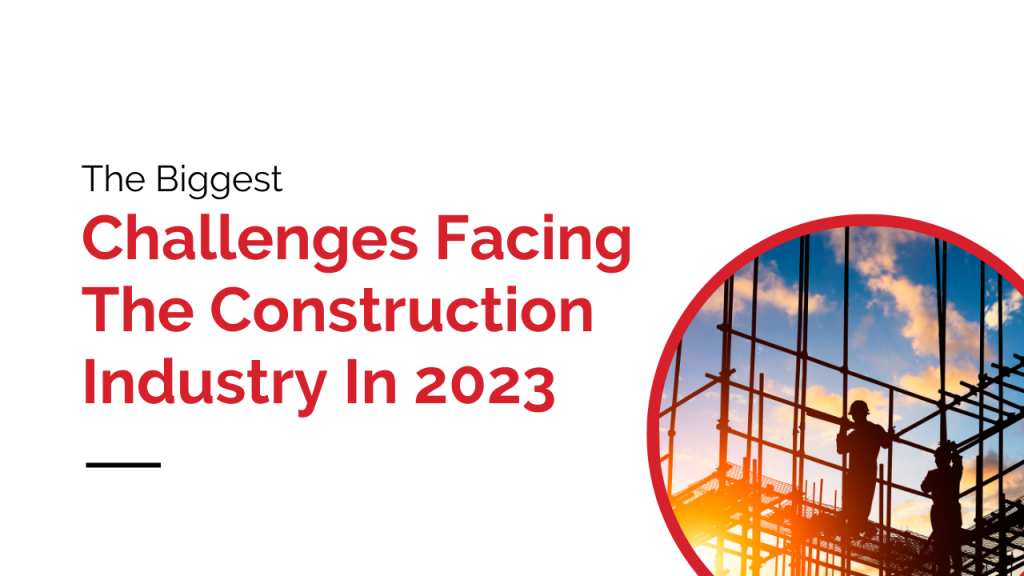In recent years, the construction industry has faced a multitude of unprecedented challenges. To name a few…projects grinding to a halt, staggering material cost increases and in some cases, insolvency.
Now in 2023, we are still faced with the aftermath of Covid-19 and other various economic uncertainties. The question is, what challenges lie ahead for the construction industry?
Throughout this article, I will be explaining some of the biggest challenges that the construction industry will face in 2023.
Material costs
There is no escaping the news surrounding economic uncertainties and the inflation crisis. As a result of these two factors, the cost of building materials has soared since the start of 2021 and even led to worldwide shortages of certain materials. In 2022, costs continued to rise amid the highest inflation rate in 40 years. But, what are the predictions for 2023? It is difficult to have a solid prediction, as prices fluctuate on a daily basis and information can be conflicting. For example, in November 2022, building products manufacturer Forterra warned its customers to prepare for a fourth rise in brick prices within 12 months. So, whilst construction material shortages do seem to have eased, the price of materials could impact your 2023 building plans. My advice is, if you’re at the planning stage or are in the middle of a project, try to plan as far in advance as you can to ensure you and your customers aren’t caught out by unpredictable material costs.
Labour and skills shortages
The construction industry is facing a severe labour and skills shortage. According to the Office of National Statistics (ONS), the number of open vacancies in UK construction hit 50,000 in the third quarter of 2022, the highest number in a decade. It was also highlighted in the 2011 census, that 1 in 5 UK-born construction workers were over 55; now, these workers will have reached retirement age and their roles are yet to be filled. It was recently reported by the Construction Skills Network (CSN) report, that a quarter of a million extra construction workers may be needed by 2026. Labour and skills shortages go hand in hand, so the question is: how can this skills gap be improved? There are a number of factors that come into play, however, one of the most significant is the need to increase visibility and awareness of the vast array of roles within the construction sector, particularly with young people and women. If we fail to close the skills gap, we could see even more severe delays to housing or infrastructure projects which aim to drive local and national economies; this is particularly critical as the UK recession is predicted to continue throughout 2023.
Digital solutions
The pandemic put the accelerator on the need for digital technologies in the construction industry. And it made one thing crystal clear…we can no longer ignore the challenge of digitisation across the industry. But, the adoption of this technology is easier said than done for some businesses. There are two main types of digital construction: Digital tools to plan projects (for example, Building Information Modelling) and digital tools to track tasks or materials (tools that facilitate connectivity, communication, and data-driven decision-making anywhere, at any time). Many smaller organisations lack knowledge and awareness of how digital technology can be utilised in the planning and construction stages. So, what is the first step to going digital? Upskill or reskill the workforce; digital qualifications can help to provide all employees with the basic skills to improve efficiencies e.g. ordering materials online, etc. Those currently employed today will make up 80% of the workforce in 2030, so it is vital that digital capabilities are adopted sooner rather than later.
It is safe to say that the construction industry has many hurdles to overcome and they are not limited to material costs, labour/skills shortages and digital challenges. However, it is difficult to predict exactly what lies ahead for construction, but there are steps we can take to work towards rebuilding the industry.
At Mercantile Barristers, we are always up to date with the latest construction news and data. This way, we can equip ourselves for the challenges that may arise for our clients in the future. It is important that you prepare yourselves too, as you never know what lies ahead – especially when it comes to construction project disputes. If you are faced with a legal issue at any stage of your project’s life cycle, please get in touch. Our members have a wealth of experience in the technology, construction and engineering industries.





